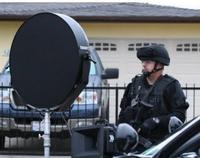-
DHS, international tech-crime investigative body, partners on cybersecurity
The High Technology Crime Investigation Association (HTCIA) said it would team up with DHS Stop. Think. Connect. Campaign’s National Network. The partnership will promote awareness of cyber security to industry, university, and government organizations nationwide.
-
-
Sponsors of CISPA to address nagging privacy concerns about the bill
House Intelligence Committee chairman Mike Rogers (R-Michigan) and Ranking Member Dutch Ruppersberger (D-Maryland), sponsors of the Cyber Information Sharing and Protection Act (CISPA), say they are currently working on the draft to alleviate privacy concerns civil liberty advocates may have about the bill.
-
-
Napolitano’s arguments about border security undermined by rise in arrests

As recently as last Thursday, DHS secretary Janet Napolitano said that border security is at its most robust in years. New numbers released on the same day tell a different story about activity on the border: arrests on the border are up 13 percent compared to this time last year, from 170,223 last year to 192,298 this year. Napolitano argues that arrests alone are not a reflection of how secure the border is, and that crime statistics in border regions – a better measure of border security, she says — are down from previous years.
-
-
More border security means more business opportunities for tech companies

At last month’s Border Security Expo in Phoenix, both start-ups and established companies showed off their inventions in an effort to pitch projects to federal agencies. Two themes emerged in the show: the expo demonstrated that many of the systems and weapons systems that were used in the Iraq and Afghanistan wars are now becoming available to local, state, and federal law enforcement agencies – and companies expressed concern about the impact the federal budget cuts will have on their pockets.
-
-
Mississippi towns build tornado-proof domes

Following a devastating tornado two years ago, the town of Smithville, Mississippi, has started construction on a tornado-proof dome. The dome, to be built on the grounds of the local high school, will double as a gym and a storm shelter. Other towns in Mississippi have also begun their own dome projects.
-
-
California city could become first in the state to ban drones
The City Council in Rancho Mirage, California was set to vote yesterday on a proposal which would ban the use of drones in residential areas in the city. If it passes, it will be the first law of its kind in the state. The ordinance would ban the flying of “unmanned aircraft that can fly under the control of a remote pilot or by a geographic positions system (GPS) guided autopilot mechanism” up to 400 feet above areas that have been zoned residential.
-
-
Maryland’s new firearms safety law requires fingerprinting gun buyers

The Maryland House of Delegates passed a new law on Wednesday which will require the fingerprinting of gun buyers, mandate background checks, restrict availability of weapons to the mentally ill, and ban certain kinds of assault weapons and magazines of more than ten bullets.
-
-
UN event highlights importance of mobile technology during disasters
A United Nations event, organized in conjunction with the Turkish government, the other day highlighted the role of innovative mobile technology in saving lives when conflicts and disasters strike.
-
-
U.S. prosecutor leaves Texas Aryan Brotherhood case due to safety concerns

A federal prosecutor in Houston has withdrawn from a racketeering case involving the Aryan Brotherhood of Texas. Assistant U.S. attorney Jay Hileman left the case due to concerns over his and his family’s safety after a Kaufman County district attorney and an assistant attorney were killed in two separate incidents. It is not known whether Hileman and his family were specifically threatened.
-
-
Georgia town requires households to have firearms

Nelson, a Georgia town of fewer than 2,000 people, has passed a mandatory gun ownership law in an effort to lower the town’s crime rate. The city council unanimously passed the Family Protection Ordinance on Monday, requiring “heads of households to maintain firearms … in order to provide for the emergency management of the city.”
-
-
DHS launches Campus Resilience pilot program
DHS secretary Janet Napolitano announced Tuesday that seven universities will participate in a national preparedness initiative designed to help campuses train for, respond to, and recover from an emergency situation.
-
-
Fully secure communication
Can worldwide communication ever be fully secure? Quantum physicists believe they can provide secret keys using quantum cryptography via satellite. These physicists have, for the first time, successfully transmitted a secure quantum code through the atmosphere from an aircraft to a ground station.
-
-
NYPD issues strict guidelines for use of social media by officers
The New York Police Department (NYPD) has issued strict guidelines for employees using social media, and ordered its employees to take a second look at their profiles on Facebook, Twitter, and other social networking sites to ensure they conform to the new rules. The NYPD follows other police departments around the country in insisting that police officers draw a clearer line between their private life, as reflected in their social media postings, and their official duties.
-
-
Spotting potential killers, rather than armed guards, would make schools safer: study

Tragedies involving children, such as the one at Sandy Hook Elementary School, fuel outrage and calls for immediate action to prevent similar atrocities. Lawmakers are debating different gun control measures, while the National Rifle Association’s unveiled a plan – the National Shield School Proposal — which calls for placing armed guards at schools. Three criminal justice researchers argue that the NRA’s proposal is problematic, expensive, and would not be effective. The researchers say there is evidence to show that in the majority of school shootings, the assailant suffered from some type of mental health issue, dysfunctional family, problems at school, social isolation, and in some instances, bullying. The article authors suggest that it is these issues that are the root cause of these tragedies, and that in order to prevent school violence, society must address troubled youth.
-
-
Exploring the human brain to support national security
The other day, at a White House event, President Barack Obama unveiled a new research initiative designed to revolutionize the understanding of the human brain. DARPA plans $50 million in 2014 investments to translate this increased understanding of brain function to create new capabilities.
-
More headlines
The long view
Why Ukraine’s AI Drones Aren’t a Breakthrough Yet
Machine vision, a form of AI, allows drones to identify and strike targets autonomously. The drones can’t be jammed, and they don’t need continuous monitoring by operators. Despite early hopes, the technology has not yet become a game-changing feature of Ukraine’s battlefield drones. But its time will come.
